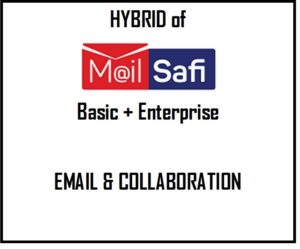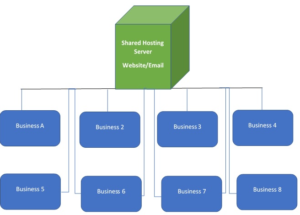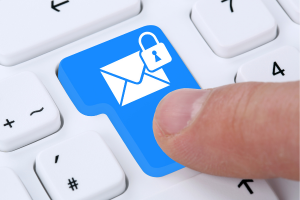Email is the backbone of business communication. It connects teams, bridges gaps with clients, and keeps the wheels of commerce turning. However, when businesses choose free email services like Gmail, Yahoo, or Outlook.com for professional use, they may unknowingly expose themselves to risks that could threaten their operations, reputation, and bottom line.
While free email services might seem convenient and cost-effective, the hidden dangers lurking beneath their surface can outweigh their benefits. This blog uncovers these risks and explains why businesses should invest in professional email solutions.
RELATED: How to Choose the Best Email Security Solution for Your Business
1. Limited Security Measures
Due to their widespread use, free email services are a prime target for cybercriminals. Here’s how their security can fall short for businesses:
- Susceptibility to Phishing Attacks: Free email accounts are more likely to be impersonated in phishing scams. The lack of advanced authentication methods can make distinguishing between legitimate and malicious emails difficult.
- Basic Spam Filters: While free services offer spam filters, they are often less sophisticated than premium solutions. This can leave businesses vulnerable to malware, ransomware, and scams.
- No Guaranteed Encryption: Some free email services don’t offer end-to-end encryption, which means sensitive business communications are at risk of being intercepted.
Case in Point: In 2020, a small law firm in the U.S. using free email lost critical client data to a phishing attack, causing massive damage to its reputation and revenue.
2. Lack of Professionalism
Your email address is often the first impression clients or partners have of your business. Using a free email domain like businessname@gmail.com can appear unprofessional and even raise questions about your company’s legitimacy.
- Brand Credibility: Custom domains (e.g., info@yourbusiness.com) convey professionalism and trust, while free email accounts lack this branding power.
- Client Perception: A professional email domain assures clients you’re established and serious about business operations.
3. Limited Storage and Scalability
Free email accounts often come with limited storage, which can be a bottleneck for growing businesses.
- Storage Constraints: Once your account reaches its storage limit, emails may bounce back or require manual deletion, disrupting workflow.
- Scaling Issues: Adding new team members or managing group communication can be cumbersome with free accounts, lacking features like shared inboxes or role-based accounts (e.g., sales@yourbusiness.com).
4. Data Privacy Concerns
Free email services monetize their platforms by collecting and analyzing user data. For businesses, this raises red flags:
- Data Mining: Your email content may be scanned for targeted advertising, putting sensitive business information at risk.
- Lack of Control: Free email providers own the platform and retain the right to access or disable accounts without notice.
Example: A startup using a free email service lost years of data when their account was mistakenly flagged and disabled due to a terms-of-service violation.
5. No Dedicated Support
When email is your primary communication tool, downtime can be disastrous. Free email services typically lack dedicated support, meaning businesses must wait in line for assistance or rely on user forums for help.
- Response Time: Without a guaranteed SLA (Service Level Agreement), resolving critical issues can take days.
- Self-Service Limitations: Free platforms often lack advanced troubleshooting tools, leaving businesses stranded during technical glitches.
6. Inability to Meet Compliance Standards
Email compliance is non-negotiable for businesses in regulated industries like finance, healthcare, or legal services. Free email services often fall short:
- No Audit Logs: Tracking email activity is essential for compliance, but free services rarely offer this feature.
- Inadequate Archiving: Regulatory requirements may demand long-term storage of email communications, which free accounts do not guarantee.
Fact: Failing to meet GDPR or HIPAA standards can result in fines or lawsuits, even if the violation was unintentional.
7. Greater Risk of Account Hijacking
Hackers frequently target free email accounts because they often lack multi-layered security measures.
- Password Vulnerabilities: Without features like two-factor authentication (2FA), accounts are more straightforward to breach.
- Shared Devices: Many small businesses access free email accounts from shared or unsecured devices, increasing risk exposure.
8. Missed Business Opportunities
Free email services lack advanced features that can enhance business communication and productivity:
- Email Analytics: Paid services like sendit provide metrics to track email open rates and responses, which are invaluable for marketing and sales teams.
- Integration with Business Tools: Free accounts may not integrate seamlessly with CRMs, project management platforms, or other tools businesses rely on.
- Automation Features: Automated follow-ups, email scheduling, and workflow management are often absent in free services.
Why Invest in Professional Email Services?
Opting for a professional email solution can address these challenges and offer benefits tailored to business needs:
- Enhanced Security: Advanced spam filters, malware detection, and encryption ensure safe communications.
- Custom Domains: Build your brand and boost client trust with a professional email address.
- Scalability: Easily add accounts as your team grows with centralized management features.
- Data Ownership: Retain complete control over your data with dedicated storage and backup solutions.
- Compliance Assurance: Meet industry regulations with built-in compliance tools.
- Dedicated Support: Get round-the-clock assistance to resolve issues promptly.
Recommended Solution: Platforms like MailSafi offer AI-powered email security, custom domains, and enterprise-grade features tailored to businesses of all sizes.
READ ALSO: Choosing the Right Email Service Provider: 12 Factors to Consider
Conclusion
While free email services might seem like an easy choice for startups or small businesses, the risks and limitations they bring can cost far more in the long run. From security vulnerabilities to data privacy concerns, the hidden dangers of free email accounts make them unsuitable for professional use.
Investing in a professional email solution is about more than enhanced security. It’s about building credibility, improving efficiency, and ensuring your business can thrive in a digital-first world.
Ready to Upgrade? Explore business email solutions like MailSafi that combine robust security, advanced features, and exceptional support to keep your communication seamless and secure.
![]()




